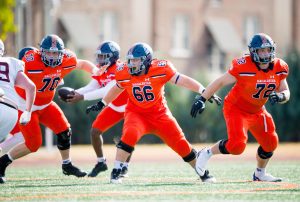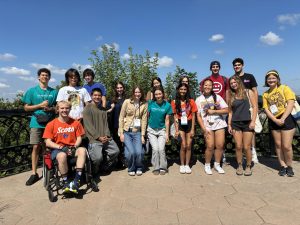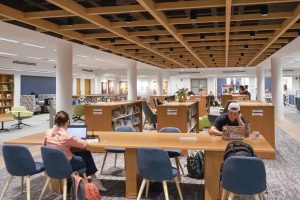Faculty, staff, students work towards accessible remote learning

September 16, 2021
This semester, Macalester is allowing all students, faculty and staff back on campus for the first time since the COVID-19 pandemic began. However, not all students are able to safely attend in-person classes due to mental and physical barriers.
On June 10, Macalester gauged students’ comfort levels with returning to campus through an email, detailing an accommodations petition process. The accommodations would include the ability to attend school remotely. Macalester doesn’t usually offer online classes, and the school is back to in-person classes. According to Paul Overvoorde, the school received less than two dozen responses from students requesting remote learning assistance.
The email sent to students on June 10 outlined that only a select few classes would be available for students to take remotely, and it warned of little flexibility when it came to those courses.
According to Director of International Student Programs Aaron Colhapp, there are only a small handful of students who are still grappling with working out their schedules remotely. A couple months ago, there were a high number of students who they were worried about.
“International students are required to be full time on their F-1 student visas,” Colhapp explained in an email to The Mac Weekly. “If they are not [full time], or take a leave of absence, they fall out of status.”
Since then, almost all of them have either set up arrangements to come to campus, or have figured out their class schedules.
“They’re solvable situations at this point,” Colhapp said about the students who are still working out their plan.
No matter the policy, these few students are struggling with accessible learning, even with the help of Disability Services and International Student Programs (ISP).
Disability Services did not have a concrete plan for students who needed remote learning accommodations. Instead, they are taking the approach of learning what works and what does not and adjusting along the way. In addition to working with students to create an integrated learning environment, they are also working to make independent studies and set up parallel classes, where a student will learn the same material over the same amount of time, just in a different environment.
“It’s not as simple as just turning on Zoom,” Disability Service Director Melissa Fletcher said.
Osamede Egharevba ‘22 is taking classes online this semester from her home in New York. While the policies and courses were difficult to navigate and set up before school began, she now has a smoothly-running class schedule. Fletcher assisted her in setting up four remote independent studies, which have the same workload and amount of class time as a full course load would.
“The process was difficult before classes started, but now that classes have started, everything is really easy and smooth,” Egharevba said. “There’s not really any difficulties that I’m running into along the way.”
ISP has worked extensively over the summer to get international students access to in-person classes, working out visas and travel plans.
“In some cases, students had provincial or local or regional travel policies that butted up against things,” Colhapp said. “I was concerned that all students would be able to arrive on time.”
However, as Colhapp pointed out, not every student that wants — or needs — to take courses virtually has figured out their plan. On Aug. 31, Macalester President Suzanne Rivera sent out a tweet expressing her excitement for the start of classes the next day.
“No, it’s not the first day of classes for everyone,” Rayan Hamid ‘22 said in an interview, in response to that tweet. “It’s the first day of class for people who are privileged enough to have the right passport and to not have physical conditions. They have classes; what about us?”
Hamid is one of a couple students who are still facing issues when it comes to remote learning. Hamid is currently living with family in London and cannot attend classes in person for multiple reasons: Not only does she face medical barriers, but her visa is soon to expire, and she doesn’t feel safe with in-person classes. Even with extenuating circumstances, Hamid has been struggling to access remote learning options.
“I spoke with everyone, and everyone told me, ‘either take a leave of absence or come back in person. We can’t help you,’” Hamid said.
Hamid advocated for herself to get enough credits so that she will be able to graduate in the spring as she had previously planned. She has worked directly and closely with professors, like Psychology Assistant Professor Morgan Gerald. Hamid acknowledged Gerald’s supportive attitude and actions towards remote learning.
“I tend to try to make accommodations for students as needed in general, so I was really open to the idea,” Gerald said about allowing Hamid to attend class synchronously through Zoom. “[Hamid] seemed like she really kind of needed more classes and was having difficulty filling her schedule, and so I was willing to give it a try.”
Egharevba chose to navigate the process by working closely with Fletcher and Disability Services, instead of going through individual professors.
“It was difficult at first just for me to navigate it on my own, because at first, it was a really daunting task to figure out how I would get all of the professors to accommodate me.” Egharevba said. “But it was just really easy because I practically didn’t have to do any of the work. Disability Services helped me organize most of it.”
Even after a year of remote learning, the resources that could help some students to learn online are not necessarily available to professors. This includes good microphones and cameras. Gerald has moved her class to a smaller room so Hamid would be able to hear and see the class. She says that it is not easy to manage a class with both remote and in-person students.
“I don’t think that my colleagues aren’t willing in a really antagonistic way,” Gerald said. “I think that it’s just we don’t have the proper resources to really support students that might be taking the class remotely.”
Hamid also appreciated the efforts that Fletcher and Colhopp had put in for her.
Fletcher acknowledged that this is a challenging effort that professors, administrators and other on-campus services will have to continue working on.
“I think that if we can imagine what kind of resources and support were needed, this can be something that other professors can potentially do in their classes as well,” Gerald said.
Hamid claimed, based on connecting with other students online, that students are not feeling fully supported when it comes to comfort and the ability to attend classes in person. Even with the actions that Disability Services, ISP and Macalester’s administration are taking, Hamid voiced her frustration.
“They knew that we’re still in a pandemic, they knew that people are immunocompromised, they knew there are travel restrictions,” Hamid said. “They knew that not everyone is vaccinated, and people have their own circumstances.”
“Based on what I understand, each of these students has either arrived on campus (thankfully the visa challenges and local travel restrictions eased over time) or made other arrangements based on their individual circumstances,” Overvoorde wrote in an email to The Mac Weekly, contradicting Hamid’s statement.
Fletcher and Colhapp anticipated much worse outcomes and greater volumes of students asking for remote learning, and for the good outcomes, they are grateful. They acknowledge that although not every situation is perfect, nearly all of their students are taken care of and have the resources that they need.
“It’s better than it was a few months ago,” Colhapp said.
Email: [email protected]











